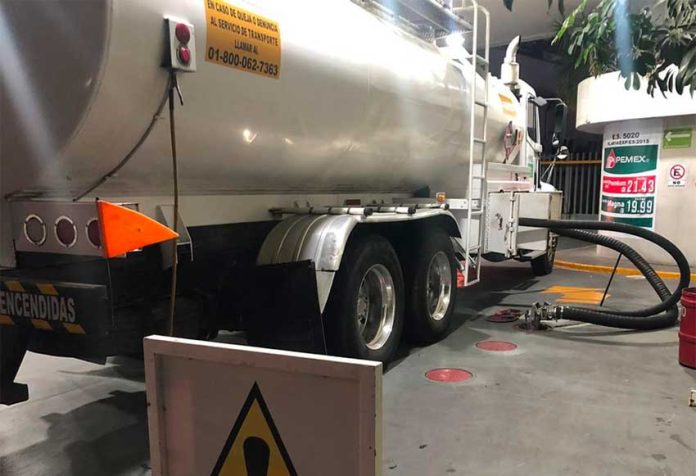Gasoline supply will return to normal in two days in Mexico City and in three to four days in México state and the Bajío region, according to the federal energy secretary.
“For Mexico City, it’s anticipated that service will be reestablished in these days . . . While for the most affected states like México state, Guanajuato and Jalisco it’s anticipated that supply will return to normal in a space of three to four days,” Rocío Nahle said in a radio interview.
But in the case of the capital, Nahle’s forecast appears overly optimistic due to another act of sabotage on the pipeline between the Veracruz port city of Tuxpan and the northern Mexico City borough of Azcapotzalco.
“They’re continuing to break into the pipelines, yesterday they did precisely that. Breaking pipelines, acts of sabotage, they took some pipelines out of operation, the Tuxpan-Azcapotzalco pipeline is out of service,” President López Obrador told reporters this morning.
“They’re working quickly to repair the pipelines so that the lives of workers and residents are not placed at risk,” he added.
It was the fifth time in less than a week that the pipeline was tapped, an act that the president called “deliberate” as criminal elements seek to prevent the restoration of fuel supplies. The pipeline delivers up to 170,000 barrels a day to the Valley of México.
In a television interview this morning, the vice-president of the gas station trade organization Onexpo said that damage to the Tuxpan-Azcapotzalco pipeline would likely prevent gasoline supply from normalizing as quickly as hoped.
“Unfortunately, we’ve just heard about that news and that means once again a delay in the flow of product towards Mexico City,” Fernando González Piña said.
While repairs to the pipeline are taking place, González said, fuel will continue to be transported by tanker trucks, “a means of transport much less efficient than pipelines.”
López Obrador said that he would “take a tour of the entire route of the Tuxpan-Azcapotzalco pipeline” next Tuesday to have meetings and “speak with the people.”
The president added that “the pipeline transports 170,000 barrels a day,” and when fuel thieves or saboteurs target it “we have supply problems.”
However, López Obrador reiterated that there are sufficient gasoline reserves to ensure that Mexico won’t be left without fuel and that the federal government’s anti-fuel theft strategy is working.
He has repeatedly said that fuel shortages in some states are due to logistics rather than supply.
Yesterday, the energy secretary refuted a report published by The Wall Street Journal Friday that said Mexico had significantly reduced gasoline imports from the United States’ Gulf Coast since López Obrador was sworn in as president on December 1.
Referring to all gasoline imports, Nahle said the state oil company bought an average of just under 765,000 barrels a day in the first nine days of January, 36.8% more than December when imports averaged 559,000 barrels a day.
The Secretariat of Energy (Sener) said that once purchases made by private companies, including ExxonMobil, Novum Energy and Windstar, were added to those made by Pemex, daily gasoline imports averaged just under 610,000 barrels a day in December and 814,500 barrels a day in the first nine days of January.
One of two journalists who wrote The Wall Street Journal story, which cited figures from United States research firm ClipperData, expressed doubt that the Sener numbers were correct.
“Given that vast majority of Mexican fuel imports come from U.S. Gulf Coast refineries, it’s hard to reconcile ClipperData’s decline of 30.2% in the daily average for January and SENER’s increase of 32%. Situation is still clear as mud,” Robbie Whelan wrote on Twitter.
More than 10 states have been affected by the gasolines shortages, which in some cases have now entered their third week.
A survey of 2,809 gas stations conducted in several states between January 11 and 13 by the Federal Consumer Protection Agency (Profeco) found that 70% had no fuel.
Motorists in states such as Michoacán, Guanajuato and Jalisco have faced long lines to fill up at service stations with fuel and the shortages have taken a heavy toll on the economy in some parts of the country.
But the government has remained adamant that it will continue to wage its war against fuel theft despite the negative consequences.
The military has been deployed to protect refineries, fuel storage facilities and petroleum pipelines and López Obrador has said that combating fuel theft, a crime that costs the government billions of pesos a year, will take as long as it takes and “will depend on who tires first [between] those who steal fuel and us.”
Nahle said yesterday that “with the security measures being implemented [including] flyovers of the pipelines, [fuel thieves] are not being allowed to arrive and puncture the pipelines whenever they want.”
Source: El Financiero (sp), Informador (sp), Milenio (sp)
